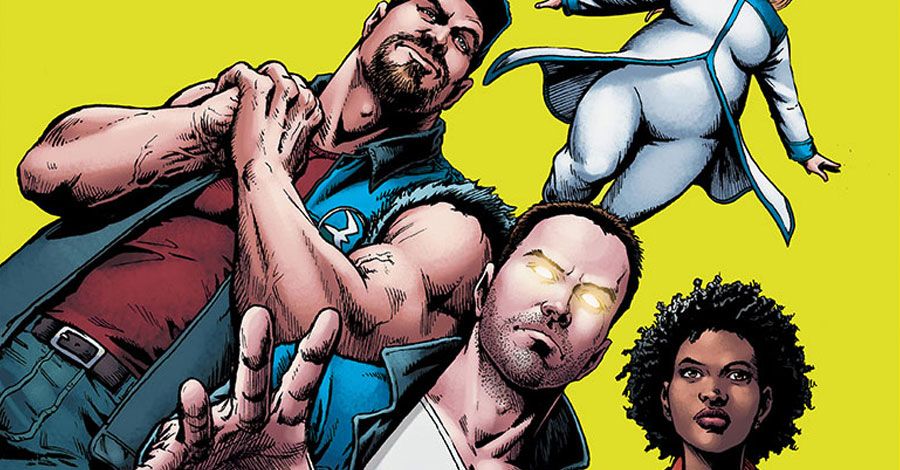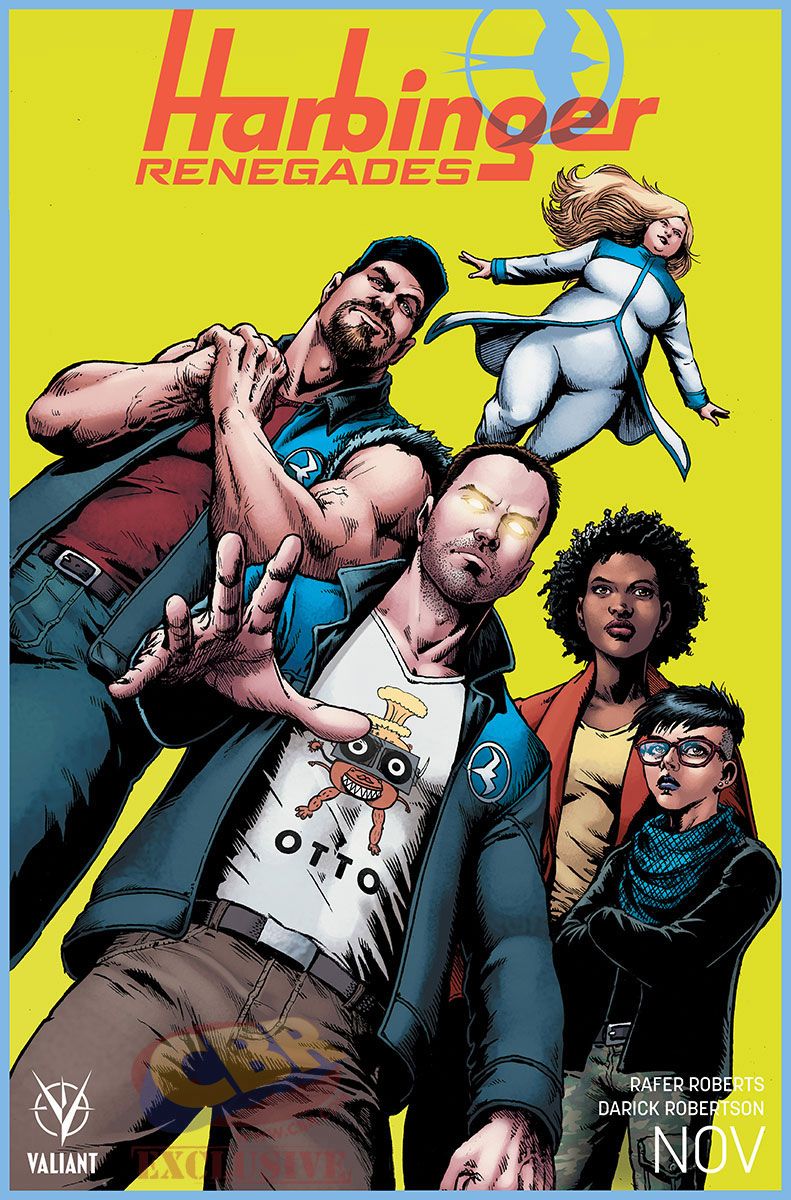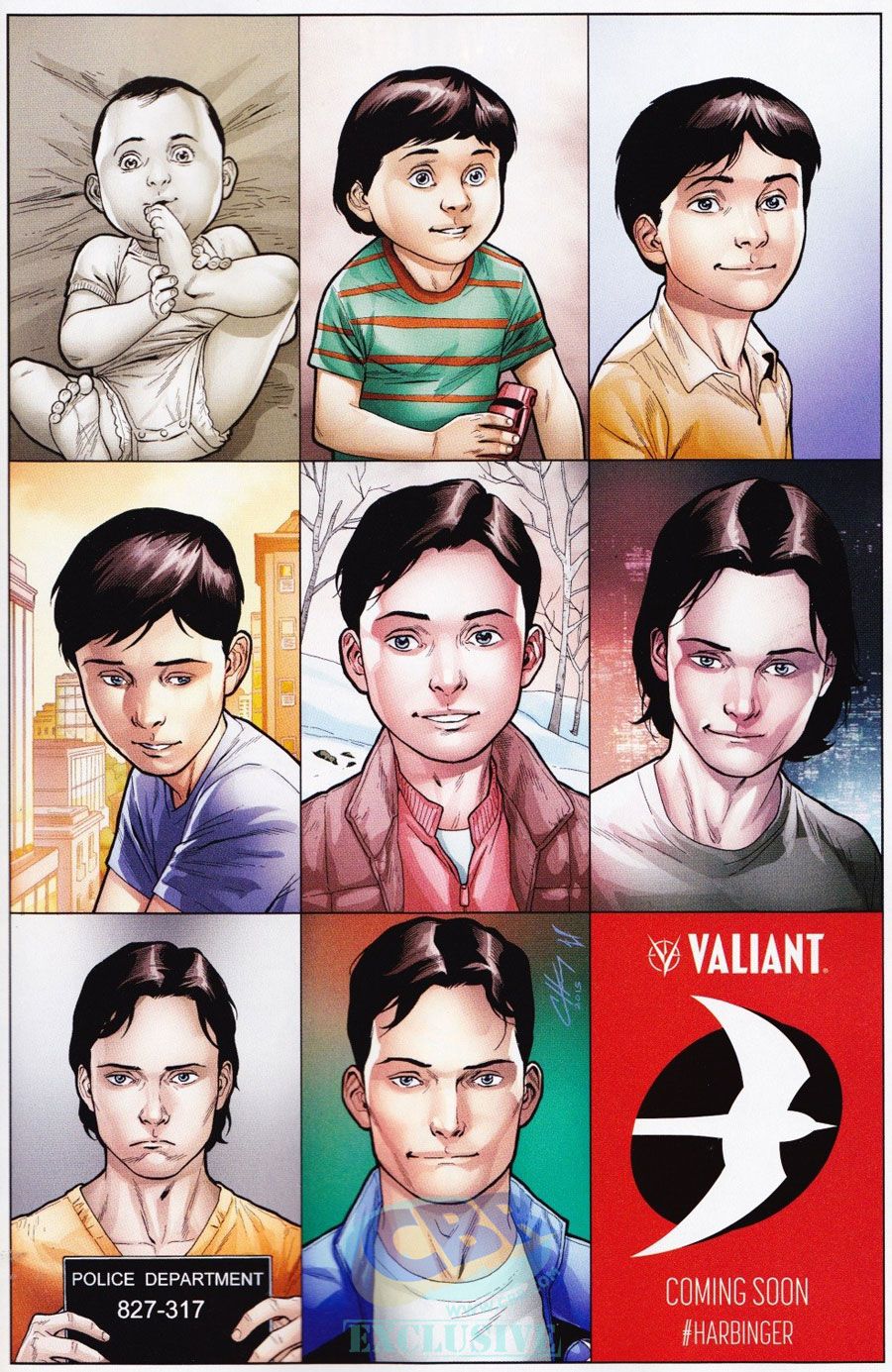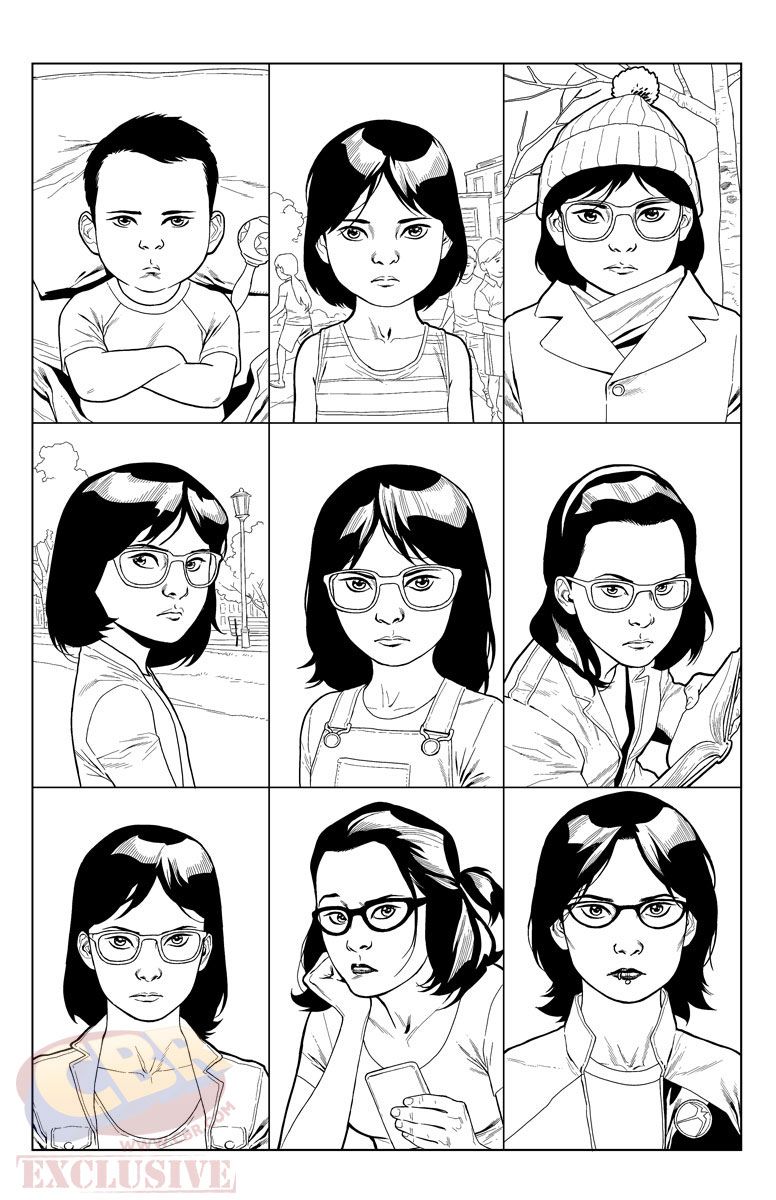2016's Valiant Summit has just wrapped in New York City, where a number of new titles from the publisher were announced, including "Harbinger Renegades," from Rafer Roberts and Darick Robertson. Reuniting the remaining members of the team in the aftermath of the previous series written by Joshua Dysart, the story picks up in a very different place to where things were last left. Formerly part of a secret government operation, the world is now well aware of the superpowered "psiots" who are growing up and into their powers. It's leading to revolution, and only the reformed Renegades team are going to be able to handle this one.
Roberts is best-known at Valiant for his work on the just-debuted "A&A," which relaunched Archer and Armstrong following the culmination of Fred Van Lente and Clayton Henry's series. However, this marks Robertson's first foray into the Valiant Universe, after long-term success on comics like "The Boys," "Transmetropolitan" and "Ballistic." CBR spoke with both members of the creative team about their work in developing the book, and what we can expect from this new chapter in the Harbinger story.
CBR News: The Renegades are a really interesting, unexpected group of people. What pulls the characters back together now, after the end of the first series?
Rafer Roberts: In every incarnation of the "Harbinger" series, the Renegades have been made up of a bunch of conflicting personality types. From the optimism of Faith or the cynicism of Kris, to the overcompensating masculinity of Torque or the infuriating complexity of Peter, these kids are pretty much a smorgasbord of the human condition. What is going to make this series fun to write is to watch how these different personalities, currently having very little or nothing to do with each other, come back together to fight for a common goal.
The first series told the story about how these teenagers fought and lost against the Harbinger Foundation, a morally grey group of superhuman "psiots" led by the cunning and powerful Toyo Harada. Not only did they lose, but they lost spectacularly. Their attack on the Harbinger Foundation led to the death of one of their own and set off a world war. It's hard to come back from something that, and each went their own way. Kris ended up in prison, Torque got a reality show, and Peter started abusing pharmaceuticals and ran off to God knows where. Only Faith stayed in the fight.
"Harbinger Renegades" begins after the events of the first series. All of Harada's secrets have been made public and there are a fair number of organizations using that information and technology to pick up where the Harbinger Foundation left off. One such group, The Solution, is using black-market tech to activate potential psiots and graft power-granting machines into regular people's heads. Faith has been doing her best to help protect the innocent from this and other groups, but it's too much work for one person to handle on her own and she could use a hand.
Who will we see in the series? Which characters are showing up -- and just as importantly, which characters won't be around?
Roberts: Everyone will be back eventually, except for people who have died. We'll even have a few new characters. In the first issue we'll meet Jay Tucker, a potential psiot who has found himself the target of both The Solution and Project Rising Spirit, a corporation specializing in creating and controlling superheroes.
Oh, and I am having a fun as hell time coming up with bad guys. You ever want to have a fun afternoon by yourself, just grab a notebook and start stream-of-conscious creating random villains.
Peter's return is crucial to the story here -- do you see this as a book with a main character, or is it more an ensemble?
Roberts: In my original pitch, I described "Harbinger Renegades" as a street-level exploration of heroism in a world beset by tragedy, pessimism, and cynicism, and the relationships of those who know they are fighting a losing battle yet continue to fight on. While Peter is the most powerful of The Renegades and was the inciting force that originally brought the team together, "Harbinger Renegades" is an ensemble book. Some arcs will feature certain characters more heavily than others (that's the nature of storytelling), but everyone will have a role to play. It's actually why we titled the book the way we did, to put the focus on the team.
This is a book about hope. It's sometimes hard to hang on to hope when you're all alone, but it's much easier when you're with your friends or family.
How are you approaching the series, Darick, in terms of the look for each character?
Darick Robertson: I really like to think about what's going on in the character's lives and minds, after understanding their personalities. I wanted to harden each of them as, from what I understand from Rafer's pitch, we're catching up with the team after they've been through quite a lot, and I think post-trauma will show through in each person.
I want to resist the urge to return to status quo with these characters, show some evolution, and make them more human. I love what Jody Houser is doing with "Faith" and hope that we can be a good companion book as Faith will be in our series as well.
I quite enjoy drawing diverse characters. One of the things I enjoyed most about co-creating and designing "The Boys" and "Transmetropolitan" was the aspect that our lead characters looked like regular people, with strength of character as their driving force as opposed to obvious gimmicks or special costumes to make them stand out. I hope to bring that design sense to Harbinger.
How carefully do you plan things like their design, fashion choices, posture and so on?
Robertson: Quite carefully, in that I really want them to feel like unique people. Even if they're gathered together for a team shot, I want their individual personalities to come through and the sense that they are all having their own thoughts and emotions.
With Kris, I wanted to show that she's stronger now, and more mature than when we last saw her. I want the death of their friend to mean something to the characters. With Torque, I want his country roots evident despite his wealth and celebrity and with Peter, I want him to reflect the power he knows he can wield now. Less the scared, confused angry kid and more of a man with a purpose. Like the difference we see in Luke Skywalker between the end of "A New Hope" and the beginning of "Return of the Jedi," when Luke shows up in Jabba's palace.
We've obviously seen Faith head off into her own book, where she met up with Torque, but the rest of the cast have mainly kept their heads down. How did the events in the first "Harbinger" series affect them, and the Valiant Universe?
Roberts: The Renegades put their heart and soul into a cause they fully believed in, lost, and created a bigger mess than when they started. That's enough to strip away any naive illusions of "the good guys always win" or "if we work hard, we can accomplish anything" and replace them with "why bother," or, "it's not my problem." And, for a little while at least, that's the understandable mind frame most of our heroes found themselves in after the first series.
Kris, the one non-powered member of the group, ended up in prison. Kris was the one who pushed hardest to take on Harada, so their failure very much had a detrimental effect. Now we find her in the process of putting her life back together, in a new relationship, and possibly finding happiness. The last thing she is looking for is another crusade to ruin that. And Peter just bugged out. He got hardcore into pills and gave up on trying to make a difference. Torque in a sense joined the "enemy," making a reality show and distracting the masses from facing all of the problems facing society.
Okay, that's a harsh assessment of Torque.
This new series is their reawakening. Kris and Peter and Torque find themselves no longer able to keep their heads buried in the sand, ignoring the problems that they helped to create.
What kind of tone can we expect? Is this going to be similar to Joshua Dysart's run, or are you looking to change things into a completely new direction?
Roberts: Joshua's run was amazing and, similar to taking over "Archer and Armstong" after Fred Van Lente, it's going to be a tough act to follow. I think that he and I are very different writers, so there can't help but be a difference, even just on the surface. I'm not approaching "Renegades" with the intention of throwing anything out or purposely moving the characters in a different direction, but the characters themselves are in a different space now.
I'm going to try to explore some pretty serious themes here...but it's me, so there's going to be a pretty healthy level of crazy. I mean, it's not going to be a comedy, but there will be some strange and light-hearted moments mixed in with the melodrama and (if I may use my favorite expression stolen from a Stephen Malkmus album) real emotional trash... At one point in my pitch I used the phrase "Jack Kirby's 'Trainspotting,'" which may sum it up pretty well.
Plus, with Darick on the artwork, I think you can assume a very nice blend of true humanity and punk subversiveness. I am beyond excited that he agreed to do so! I was a frequent visitor to the old Warren Ellis Forum during my comic making gestative years, so to say "Transmetropolitan" is a huge influence on me would be an understatement. Basically at this point I'm just going to do my best to turn in scripts that I hope Darick will enjoy drawing.
What does Darick's particular style bring to comics, for you?
Roberts: I enjoy artists with their own style, where you can look at it and say, "That's a Darick Robertson," or, "That's a David Lafuente." Darick has this unique linework that, I think, captures a textured real-world feel without ever venturing too far into realism. His ability to create whacked out environments that feel real, or to draw regular environments and give them life is amazing. And I don't know of too many artists working who utilizes character posture in order to convey emotion and personality as well as Darick. Plus, he can draw anything and, from what I can tell from his body of work, is fearless.
Which part of the series are you most enjoying writing here, at the start, as you get to grips with the characters and their world?
Roberts: Oh, man -- would it be cheating to say, "Everything?" Honestly, it's the characters and their dynamic. Just like in "A&A," all the weird superhero stuff would be nothing if the characters didn't have heart. I also enjoy writing conversations, the back and forth between opposing viewpoints, and getting all of these different voices together is amazing.





